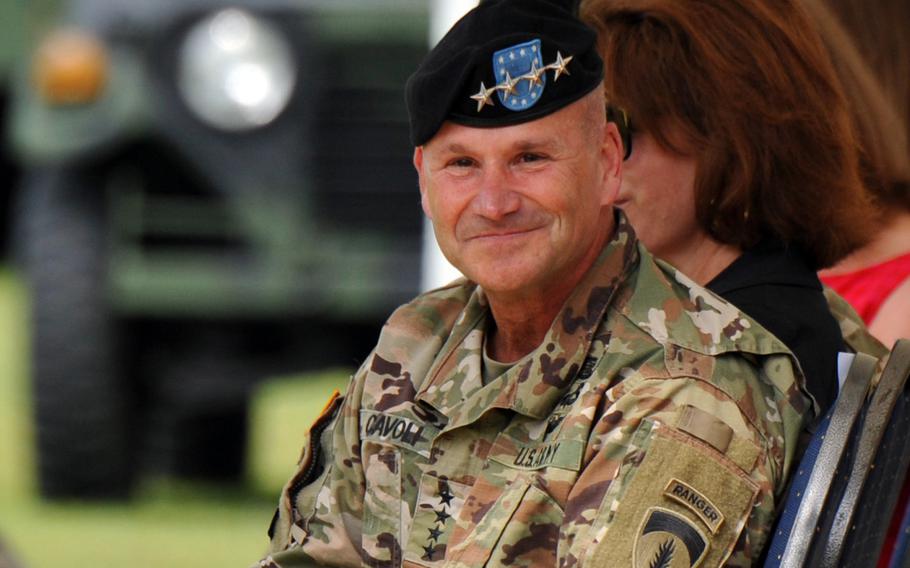
Gen. Christopher Cavoli, commander of U.S. Army Europe-Africa, listens to speeches at the 21st Theater Sustainment Command change of command ceremony in Kaiserslautern, Germany, in June 2021. Cavoli was nominated Tuesday, May, 3, 2022, by President Joe Biden to serve as NATO’s next supreme allied commander. (Michael Abrams/Stars and Stripes)
STUTTGART, Germany — The U.S. Army’s top general in Europe was nominated Tuesday by President Joe Biden to serve as NATO’s next supreme allied commander, a two-pronged job that also involves command of American troops in Europe.
Gen. Christopher G. Cavoli, who has led U.S. Army Europe and Africa for the past four years, will replace U.S. Air Force Gen. Tod Wolters, if confirmed.
NATO’s North Atlantic Council, the alliance’s highest decision-making body, backed the decision Tuesday. The alliance said Cavoli is expected to take command during the summer upon approval by the U.S. Senate.
The change comes at a critical time for NATO and overall security in Europe because of Russia’s war in Ukraine, which is expected to have long-term implications for U.S. military missions on the Continent.
Cavoli would be instrumental in any future changes to the military’s force design in Europe as NATO’s top military commander and leader of U.S. European Command, which is based in Stuttgart, Germany.
The Pentagon is now assessing how the miliary might be required to adapt along NATO’s eastern flank given Russia’s aggressive moves and unpredictability.
As the Army’s top commander in Europe, Cavoli has overseen a mission that was expanding before Russia’s invasion of Ukraine in February.
Multiple new Army units have taken up positions in Europe in recent years, marking a reversal of the steady downward trend in troops on the Continent that happened during a decadeslong, post-Cold War drawdown. The amount of U.S. forces has continued to increase since Russia’s attack on Ukraine.
There are now more than 100,000 U.S. troops in Europe, the highest number in nearly two decades.
Cavoli, a Russian speaker and foreign-area officer by training, was born to an Army family in Wuerzburg, Germany, during the Cold War and grew up at various military bases throughout Europe.
A graduate of Princeton University, he served multiple tours in Afghanistan. He also was director for Russia on the Joint Staff in a previous posting.
A replacement for Cavoli at Army headquarters in Wiesbaden, Germany, has not yet been announced.